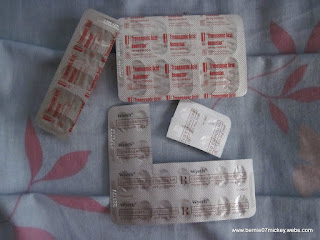Yesterday i went home early because of excessive heavy menstrual flow. It's like I'm peeing blood and every time i stand up i can feel that there's a heavy flow of blood gushing in me. We dropped by at San Juan De Dios to meet and have check up with my OB. He told me i need to have a Trans vaginal Ultrasound to make sure what really is causing the bleeding. The results showed that the excessive bleeding is caused by my Thickened Endometrium. Curious and a bit worried i researched about what Thickened Endometrium really is...
 |
| The Ultrasound Findings: Thickened Endometrium |
Hyperplasia or thickened endometrium is a condition, where the lining of the uterus becomes too thick. The thickened endometrium lining leads to abnormal bleeding. Thickened endometrium causes are too much estrogen in the body, irregular menstrual cycle and deficiency of progesterone. The thickened endometrium or hyperplasia is a non-cancerous condition.
Classification of Thickened Endometrium
The glands forming cells of the hyperplastic endometrium undergo changes when they are predisposed to the cancerous formation. There are two types of endometrial hyperplasia:
- Hyperplasia without atypical changes
- Hyperplasia with atypical changes
In case of atypical changes, the cells are changed and become abnormal. This increases the risk of developing womb cancer.
Symptoms of Thickened Endometrium
The symptoms of thickened endometrium include:
- Vaginal discharge
- Bleeding between menstrual cycle
- Heavy and prolonged menstrual periods
- Pain in the abdomen
- Pelvic pain
Who are at Risk of Developing Thickened Endometrium
The women who are at risk of developing thickened endometrium are:
- Women who have undergone menopause
- Women who don't ovulate or have irregular ovulation, that is, late periods
- Obese or overweight women
- Diabetics
- Women with polycystic ovary syndrome
Diagnosis of Thickened Endometrium
The diagnosis of thickened endometrium depends on your age and how long have you been suffering from thickened endometrium. The doctor may carry out a biopsy before carrying out thickened endometrium treatment and also to rule out cancer.
Thickened Endometrium Treatment
Endometrial hyperplasia or thickened endometrium can be treated with medication in many cases. Birth control pills or hormone progesterone is usually given as medication for thickened endometrium treatment. Most often hysterectomy is advised as thickened endometrium treatment. Many times hyperplasia may lead to cancer and therefore the doctor may observe you for some time, if you do not undergo hysterectomy.
Since im still young and not yet on the menopousal stage, Doc told me that it maybe caused by hormonal changes due to my previous pregnancy and giving birth. I need some medication, rest and refrain from carrying heavy objects. He also prescribed 4 types of medicines for me: Premarin, Hemostan (Tranexamic Acid), Provera and BC Pills.
 |
| My Premarin and Hemostan |
Premarin.
PREMARIN is a hormone therapy that contains a combination of estrogens. It can help you manage the symptoms of menopause, including hot flashes, night sweats, and vaginal dryness, as well as reduce your chances of developing osteoporosis (thin, weak bones).
PREMARIN is for women without a uterus (hysterectomy) who havemoderate to severe menopausal symptoms—hot flashes, night sweats, and vaginal dryness.
When your only menopausal symptom is vaginal dryness, your health care professional may recommend you use a topical vaginal product.
It is best to take PREMARIN at the lowest possible effective dose for the shortest period of time. For this reason, PREMARIN comes in five dosage strengths so that you and your physician can determine which dose is best for you. Studies have shown that PREMARIN was effective in relieving the hot flashes, night sweats, and vaginal dryness related to menopause, and can also help to prevent osteoporosis.
For women who have not had a hysterectomy, and are experiencing moderate to severe menopausal symptoms, PREMARIN can also be used in combination with a progestin tablet. You and your health care professional can decide which approach to managing menopausal symptoms may be right for you.
Hemostan (Tranexamic Acid).
This medication is used short-term in people with a certain type of bleeding disorder (hemophilia) to prevent and reduce bleeding from having a tooth pulled (extraction). It is also used in people with other high-risk bleeding conditions to control bleeding at such times as after surgery or an injury, during heavy nosebleeds, or during heavy menstrual bleeding.Tranexamic acid works by helping the blood clot normally to prevent and stop prolonged bleeding. It belongs to a class of drugs known as anti-fibrinolytics.
Provera.
Medroxyprogesterone is a type of female hormone (progestin). This medication is similar to the progesterone that your body naturally makes and is given to replace the hormone when your body is not making enough of it. This medication has several uses. In women who are not pregnant and not going through menopause, this medication is used to treat abnormal bleeding from the uterus and to restore normal menstrual periods in women who have stopped having them for several months (amenorrhea).
Medroxyprogesterone is also used as part of combination hormone replacement therapy with estrogens to reduce menopause symptoms (e.g., hot flashes). Medroxyprogesterone is added to estrogen replacement therapy to reduce the risk of cancer of the uterus.
Now I'm on a 1 week leave for my medication and rest. Hoping everything goes well and sooner to be okay. I don't want to spend the whole vacation at home. I want to have a family bonding with my hubby and kids.
Happy Vacation everyone and don't forget to pray and remember all our Lord has done for us.




























1 comment:
Hello..
Thank you very much for this wonderful work ..
a href='http://parentingjobshouse.com/endometrial-hyperplasia-symptoms' rel='dofollow' target='_blank' title='Keyword'>endometrial hyperplasia</a
Post a Comment